External links
- "Baby names starting with O". Baby Names. Retrieved 9 September 2013.
| Gender | Male |
|---|---|
| Language(s) | German |
| Other names | |
| Variant form(s) | Adamarus, Ademar, Adhemar, Audomar Otmar, Ottmar |
| Derived | Audamar |
Othmar, also spelled Otmar or Ottmar, is a masculine German given name, derived from the Germanic name Audamar, from the elements aud "wealth, prosperity" and mar "fame".
Notable people with the name include:

The Abbey of Saint Gall is a dissolved abbey (747–1805) in a Catholic religious complex in the city of St. Gallen in Switzerland. The Carolingian-era monastery existed from 719, founded by Saint Othmar on the spot where Saint Gall had erected his hermitage. It became an independent principality between 9th and 13th centuries, and was for many centuries one of the chief Benedictine abbeys in Europe. The library of the Abbey is one of the oldest monastic libraries in the world.
Weber is a surname of German origin, derived from the noun meaning "weaver". In some cases, following migration to English-speaking countries, it has been anglicised to the English surname 'Webber' or even 'Weaver'.
Stephan is a male given name, a variant of Stephen.

Othmar Reiser or Otmar Rajzer was an Austro-Slovenian ornithologist and naturalist who worked as curator of the bird collections in the natural history museum at Sarajevo, working there from its foundation for thirty-three years during which he explored various regions including the Balkans and South America and collected specimens. Several species have been named after him.
Gottlieb is a theophoric name that is used as a surname or as a male given name. Gottlieb appeared in High German in the 17th century, in German speaking parts of Europe. It was a product of the age of pietism, giving young men a religiously charged name. Earlier forms of the name are attested from the 6th century in the Gothic language as Gudilub, normalized as 'Gudaliufs'.
Hassler is a toponymic surname derived from a number of places called Hasel or Hassel in German-speaking parts of Europe.
Eugen is a masculine given name which may refer to:
Schenk is a Jewish (Ashkenazic) and German occupational surname derived from schenken referring to the medieval profession of cup-bearer or wine server. At one time, only Jews were allowed to sell alcohol in the Russian empire, which is why Shenk (Russian) and its later surname variants are very common. People with this surname include:

Ottilie is a given name for women. The name is a French derivative of the medieval German masculine name Otto, and has the meaning "prosperous in battle", "riches", "prosperous" or "wealth".
Rauscher is a German surname. Notable people with the surname include:

Ludwig is a German name, deriving from Old High German Hludwīg, also spelled Hluotwīg. Etymologically, the name can be traced back to the reconstructed Proto-Germanic name *hlūdawiganaz, which is composed of two elements: *hlūdaz and *wiganą respectively, the resulting name meaning "famous warrior" or "famous in battle".

Leopold is the modern form of the Germanic name Luitbald, composed of two stems, common to Germanic names. The first part is related to Old High German liut meaning "people", the second part bald or balt is of Germanic origin and means "brave". The name is not related to the names Leon and Leonard which mean lion. The name gradually spread across Western Europe and during the 16th century it became popular in the southern Holy Roman Empire, due to the influence of the Margraves of Austria from the Babenberg dynasty.

Ursula is a feminine given name in several languages. The name is derived from a diminutive of the Latin ursa, which means "bear". The name has been rather uncommon in the English-speaking world, although its use has been influenced since the twentieth century by the Swiss-born actress Ursula Andress.
Mayer is a common German surname and less frequent as a given name. Notable people with the name include:
Heinz is a German given name, a diminutive of Heinrich and cognate of the given name Henry. People with this given name include:
Kühn is a surname of German origin, derived from the Old German name Conrad. It may refer to one of the following people:
Brunner is a German surname. It originated from the Middle High German word Brunne meaning spring or water well. It can also refer to people from places named Brunn. Notable people with the surname include:
Hofmann is a German surname. Notable people with the surname include:
Gutmann is a German or Jewish surname, colloquially meaning "husband", "yeoman", or "working man".
Wolfram is both a given name and surname of Germanic origin. It is composed as wolf ‘wolf’ + hrafn ‘raven’, important in Germanic mythology.